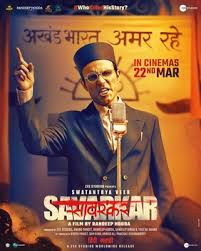Swatantrya Veer Savarkar (2024)
Swatantrya Veer Savarkar (2024)
Director: Randeep Hooda
Producers: Randeep Hooda, Sam Khan,
Anand Pandit, Yogesh Rahar, Sandeep Singh
Cast: Randeep Hooda (Vinayak Damodar
Savarkar), Santosh Ojha (Lokmanya Tilak), Anjali Hooda (Bhikaji Cama), Rajesh
Khera (Gandhi), Mrinal Dutt (Madanlal Dhingra), Russell Geoffrey Banks (David
Barry)
A thrilling, chilling, and inspiring
movie about one of India’s greatest revolutionaries and freedom fighters and a
stellar performance by Randeep Hooda!
The year is 1896. In Maharashtra
(then part of the Bombay Presidency), the bubonic plague has spread through the
local populace, and Damodar Savarkar succumbs to it. His eldest son, Vinayak
Damodar Savarkar, shoulders the responsibility of his family.
Over the years, Savarkar notices the
brutality, and cruelty
of British colonials in India, and becomes deeply influenced by the
revolutionaries of the world. In 1903, he and his elder brother Ganesh Savarkar
start the Mitra Mela, later the Abhinav [SB1] Bharat Society, a revolutionary
secret society.
Savarkar believed that understanding
British law was integral to the revolution of removing British rule, entered
the prestigious Fergusson College in Pune, where he studied law and quickly
became the top student. He continued his revolutionary activities there, and expanded
the Abhinav Bharat Society. Later, he went to London for his law studies,
courtesy of a scholarship obtained
with the help of Lokmanya Bal Gangadhar Tilak.
In London, he lived at the India
House, which was generally considered to be just a hostel for Indian students
in London, but was a place for Indian revolutionaries like Savarkar, Madanlal
Dhingra, Senapati Bapat, VVS Aiyar, Bhikaji Cama, and many others. Promptly,
Savarkar recruited them all into the Abhinav Bharat Society.
Savarkar, now a lawyer, went on to
give speeches, write books, and educate people for and about the overthrow of
British rule in India. He influenced many of his fellow students at India House
to assassinate major British leaders, using guns and bombs supplied by Vladimir
Lenin. [SB2] One of them, Madanlal Dhingra,
assassinated Curzon Wyllie and was sentenced to hanging at the age of 24.
In 1910, Savarkar was charged with
the conspiracy to overthrow the British government and bomb the Parliament and
sedition. Hoping to evade arrest, Savarkar went to Bhikaji Cama’s house in
Paris, but against advice from his friends and compatriots of India House, he
returned to London, on the grounds that he will be given a trial in a court in
Britain and be given a maximum of 3 years in prison.
Unfortunately, Savarkar was arrested
immediately and sent on a ship to India to be given an unjust trial there.
While in the Mediterranean on the way to the Suez Canal, Savarkar makes a
daring escape through the lavatory window of the ship carrying him, and swam to
the French coast, as British police officers will be unable to arrest him in
France. The British police drag him to the ship again, and take him to India.
He is sentenced to 2 life sentences
in the Kalapani jail in the Andaman and Nicobar Islands. Over there, Savarkar
sustained numerous heinous forms of torture, including regular whippings, being
forced to press oil in place of a bull, slave labor, and many, many rounds of
solitary confinement. The jailer, David Barry, paid special attention to
Savarkar, considered him his most dangerous prisoner, and consistently abused
and tortured him more than everybody else. Want to know more? Watch the movie!
This movie was great! With a
different take on history than usual, highlighting the revolutionary aspect of
the Indian freedom movement, more so than the nonviolent. It is true that it
played a major role in the freedom of India, but the revolutionary aspect was
also enormous. I also loved the thing that it also depicted Savarkar’s life
after the independence of India. It was epic! As many people have earlier, I
must commend Randeep Hooda’s stellar, and legendary performance as Savarkar.
The main complaint I have with this
movie is the ENDING SONG. All this tension built up with the movie and the
ending ‘rap’ just ruins it all. Savarkar was a great poet as well as a
revolutionary, and there’s so many songs that he wrote. One such was ‘Anadi Mi
Ananta Mi Avadhya Mi’, which is far more fitting.
I wholeheartedly recommend
this movie [SB3] because:
1.
Excellent
acting.
2.
Epic
screenplay.
3.
The
revelation of forgotten history.
4.
Overall,
this movie is excellent!



Comments
Post a Comment